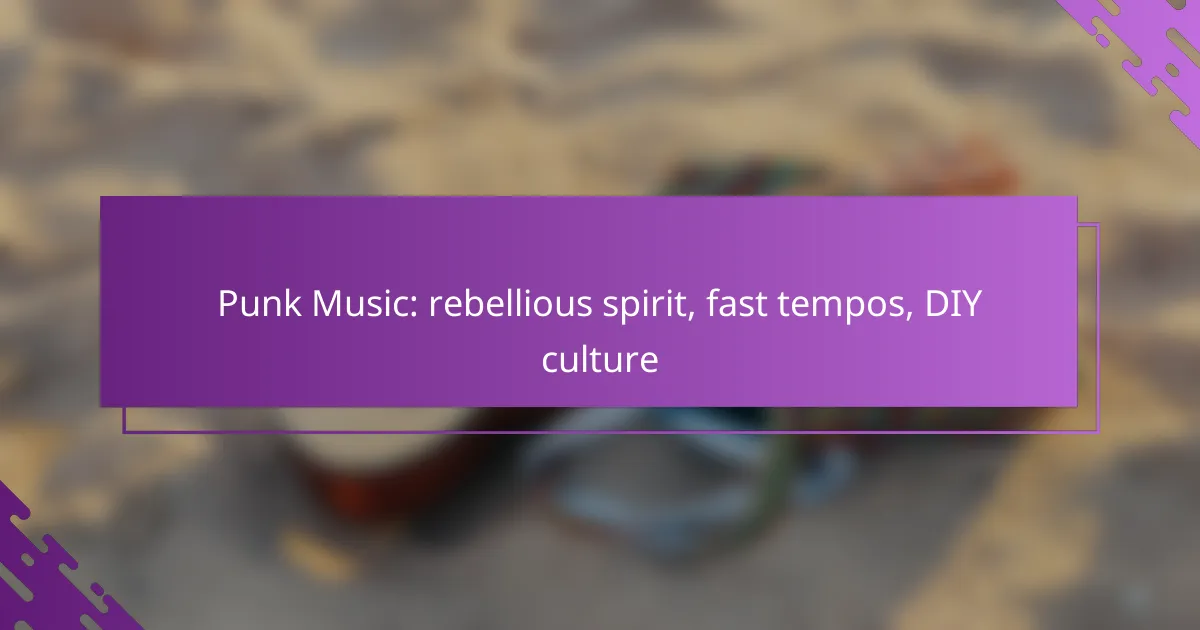Punk music embodies a rebellious spirit, characterized by fast tempos and a do-it-yourself (DIY) culture that defies mainstream norms. This genre serves as a powerful voice for the marginalized, promoting individualism and resistance against authority. Its raw energy and authenticity have left a lasting impact on modern music, influencing a wide range of styles from alternative rock to hardcore.
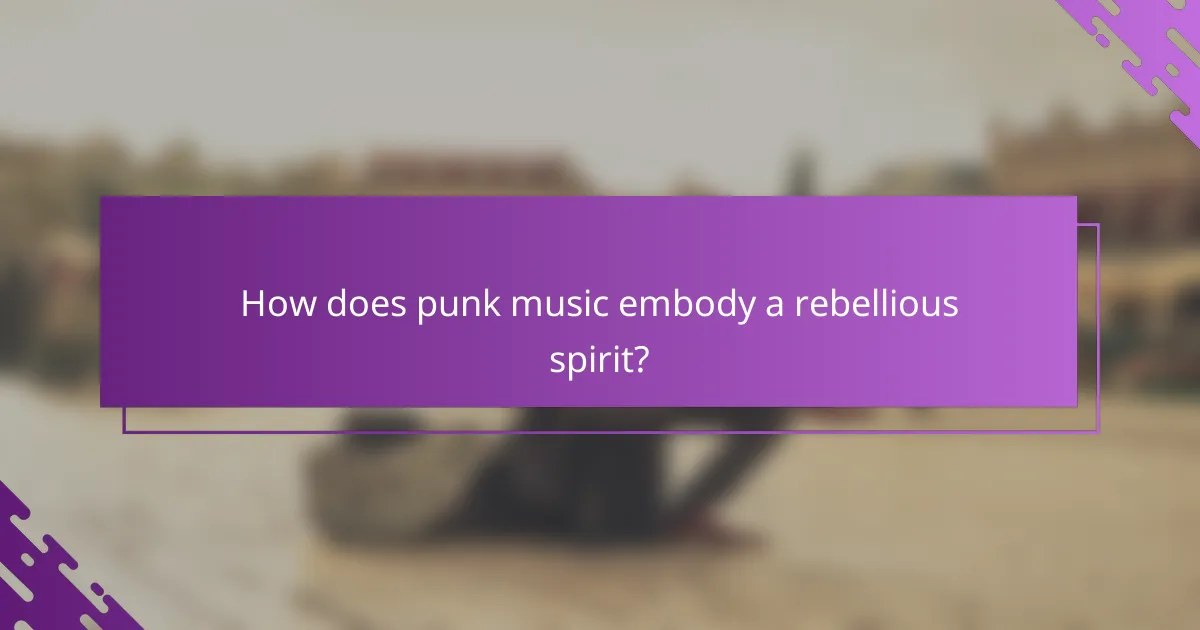
How does punk music embody a rebellious spirit?
Punk music epitomizes a rebellious spirit through its defiance of mainstream culture, aggressive sound, and a focus on individualism. This genre challenges societal norms and promotes a message of resistance against authority, making it a voice for the marginalized and disillusioned.
Anti-establishment themes
Anti-establishment themes are central to punk music, often expressing dissatisfaction with political systems, social injustices, and consumer culture. Lyrics frequently critique government actions, corporate greed, and societal expectations, encouraging listeners to question authority and think independently.
For example, songs like “Anarchy in the U.K.” by the Sex Pistols directly confront the British government, while bands like Dead Kennedys use satire to highlight social issues. This critical stance resonates with audiences seeking authenticity and change.
Influence of counterculture movements
Punk music draws heavily from various counterculture movements, including the Beat Generation and the hippie movement, which emphasized freedom of expression and anti-establishment sentiments. These influences shaped punk’s raw sound and aesthetic, promoting a do-it-yourself (DIY) attitude.
The 1960s and 1970s counterculture laid the groundwork for punk’s emergence, as artists sought to break free from conventional norms. This connection is evident in the way punk bands often align themselves with activist causes, advocating for social justice and equality.
Iconic punk bands
Several iconic punk bands have significantly shaped the genre and its rebellious spirit. The Ramones, often credited as the first punk band, set the stage with their fast tempos and simple, catchy songs. Other influential bands include The Clash, known for blending punk with reggae and rock, and Bad Brains, who introduced hardcore punk to the scene.
These bands not only defined the sound of punk but also inspired countless others, creating a legacy that continues to influence modern music. Their commitment to challenging norms and pushing boundaries remains a hallmark of punk culture.
DIY ethos
The DIY ethos is a fundamental aspect of punk music, emphasizing self-sufficiency and independence from commercial music industries. Punk musicians often produce their own records, organize shows, and create their own merchandise, fostering a sense of community and collaboration.
This approach allows artists to maintain creative control and authenticity, avoiding the constraints imposed by major labels. The DIY spirit encourages fans to participate actively, whether by forming bands, starting fanzines, or organizing local events, further strengthening the punk community.
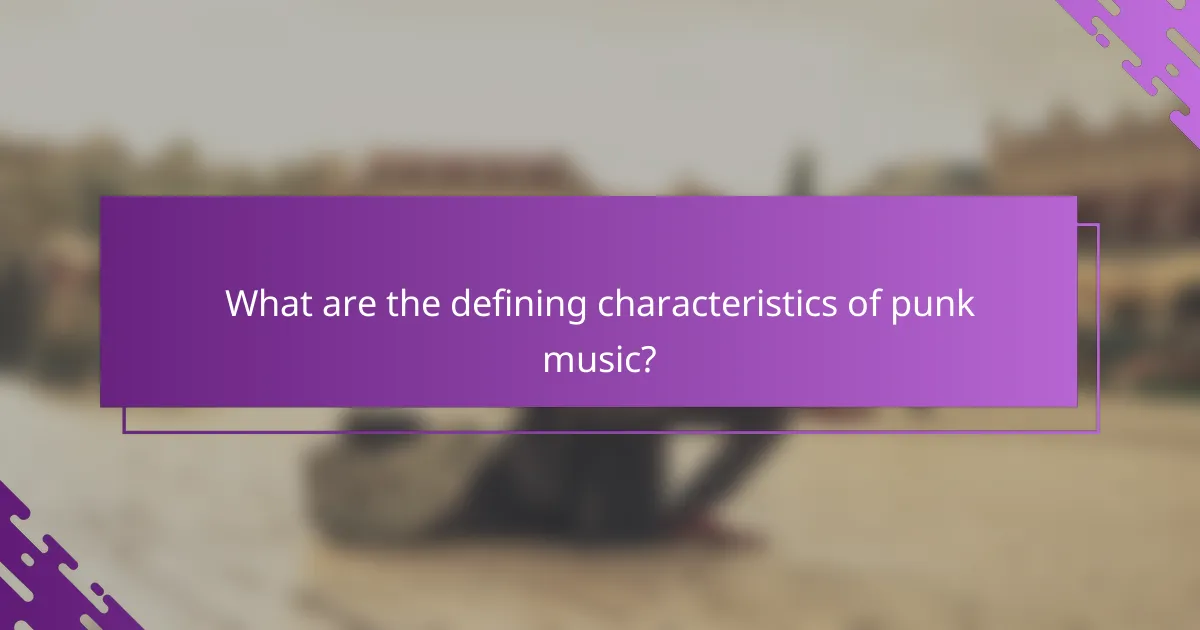
What are the defining characteristics of punk music?
Punk music is characterized by its rebellious spirit, fast tempos, and a do-it-yourself (DIY) culture. These elements combine to create a distinct sound and ethos that challenges mainstream norms and celebrates individuality.
Fast tempos
Fast tempos are a hallmark of punk music, often ranging from 150 to 200 beats per minute. This energetic pace drives the music forward and enhances its rebellious nature, making it ideal for live performances and mosh pits.
Many classic punk songs feature rapid drumming and aggressive guitar riffs that contribute to the overall intensity. Bands like The Ramones and Sex Pistols exemplify this characteristic with their quick, catchy tracks that invite listeners to engage physically and emotionally.
Raw sound
The raw sound of punk music is defined by its unpolished production and straightforward instrumentation. This aesthetic reflects the genre’s DIY ethos, where bands often record in low-budget settings to capture an authentic feel.
Instruments are typically played with minimal effects, emphasizing a gritty, direct sound. Vocals are often delivered with a sense of urgency and passion, further enhancing the genre’s rebellious spirit. This approach allows punk music to resonate with listeners seeking authenticity over commercial polish.
Simplistic song structures
Punk songs generally feature simplistic song structures, often adhering to a verse-chorus format that is easy to follow. This simplicity allows for quick songwriting and encourages participation from audiences during performances.
Many punk tracks are short, typically ranging from one to three minutes, which keeps the energy high and the message clear. This straightforward approach makes punk accessible, inviting new listeners to engage with the music and its themes of rebellion and social commentary.
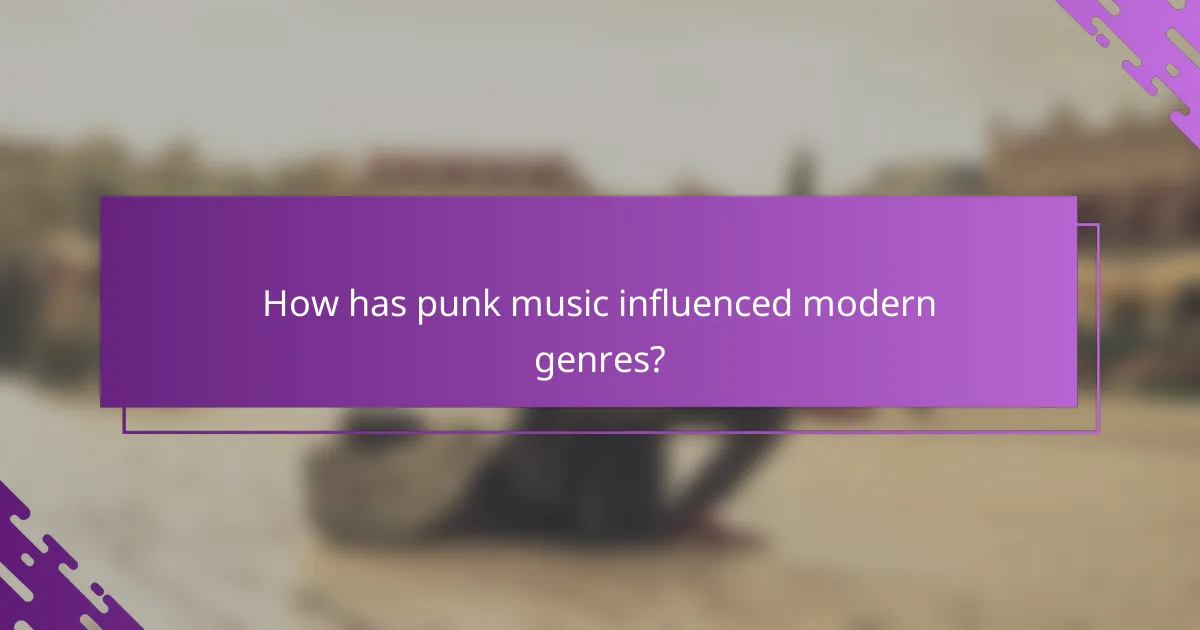
How has punk music influenced modern genres?
Punk music has significantly shaped modern genres by introducing a raw, energetic sound and a DIY ethos that encourages independence and authenticity. Its influence can be seen across various styles, from alternative rock to pop punk, and even in the heavier realms of hardcore and metal.
Impact on alternative rock
Punk’s influence on alternative rock is evident in its emphasis on rebellious themes and a do-it-yourself approach to music production. Bands like Nirvana and Green Day infused punk’s fast tempos and raw sound into their music, creating a bridge between punk and mainstream rock.
This fusion led to a more diverse sound within alternative rock, allowing for experimentation with various styles while maintaining punk’s core values of authenticity and resistance to commercialism.
Influence on pop punk
Legacy in hardcore and metal
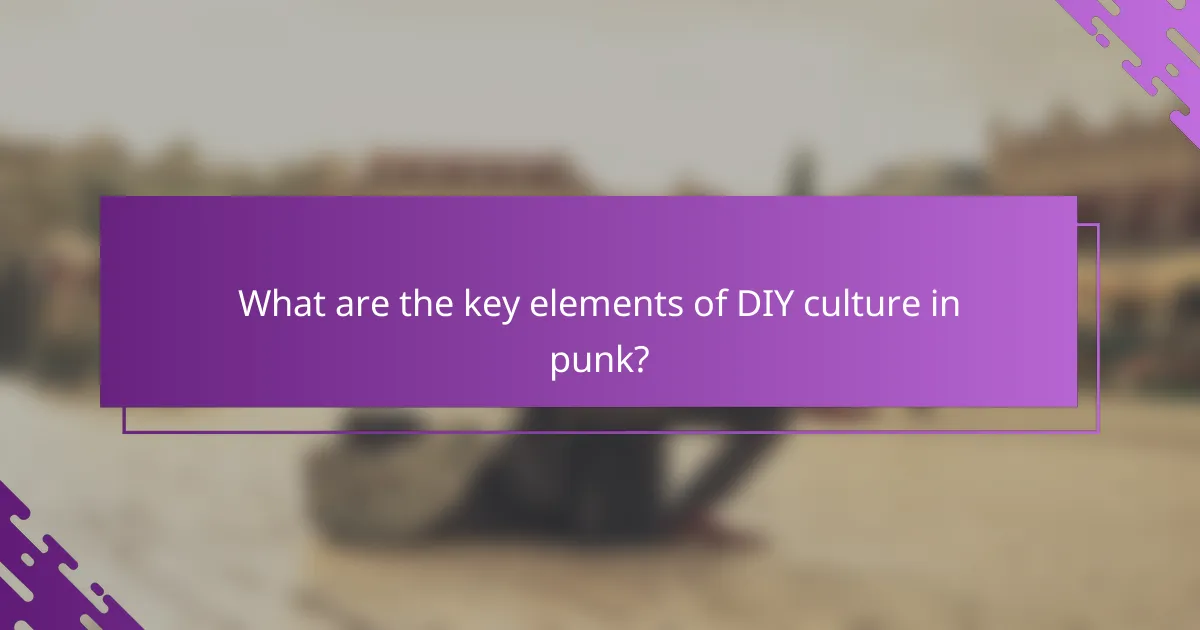
What are the key elements of DIY culture in punk?
DIY culture in punk emphasizes self-sufficiency and independence, allowing artists to create and distribute their work without relying on major industry players. This approach fosters creativity and community, empowering musicians to maintain control over their artistic vision.
Independent record labels
Independent record labels are crucial to the DIY culture in punk, as they provide an alternative to mainstream music companies. These labels often focus on niche genres and support emerging artists, allowing them to release music that aligns with their values and style.
Many independent labels operate on tight budgets, which encourages innovative marketing strategies and unique artist collaborations. Examples include labels like Fat Wreck Chords and Epitaph, which have built strong reputations by prioritizing artist development and community engagement.
Self-produced music
Self-produced music is a hallmark of DIY punk, enabling artists to record and release their work without traditional studio support. Musicians often use affordable recording equipment and software to create high-quality tracks from home or in community spaces.
This approach not only reduces costs but also allows for greater artistic freedom. Bands can experiment with their sound and release music on their own schedule, often leading to a more authentic connection with their audience.
Grassroots promotion
Grassroots promotion is essential in the DIY punk scene, relying on word-of-mouth, social media, and local events to build a fan base. Artists often engage directly with their audience through shows, merchandise, and online platforms, fostering a sense of community and loyalty.
Effective grassroots strategies include organizing local shows, collaborating with other bands, and utilizing social media to share updates and connect with fans. This personal touch helps create a dedicated following and can significantly impact an artist’s visibility and success.
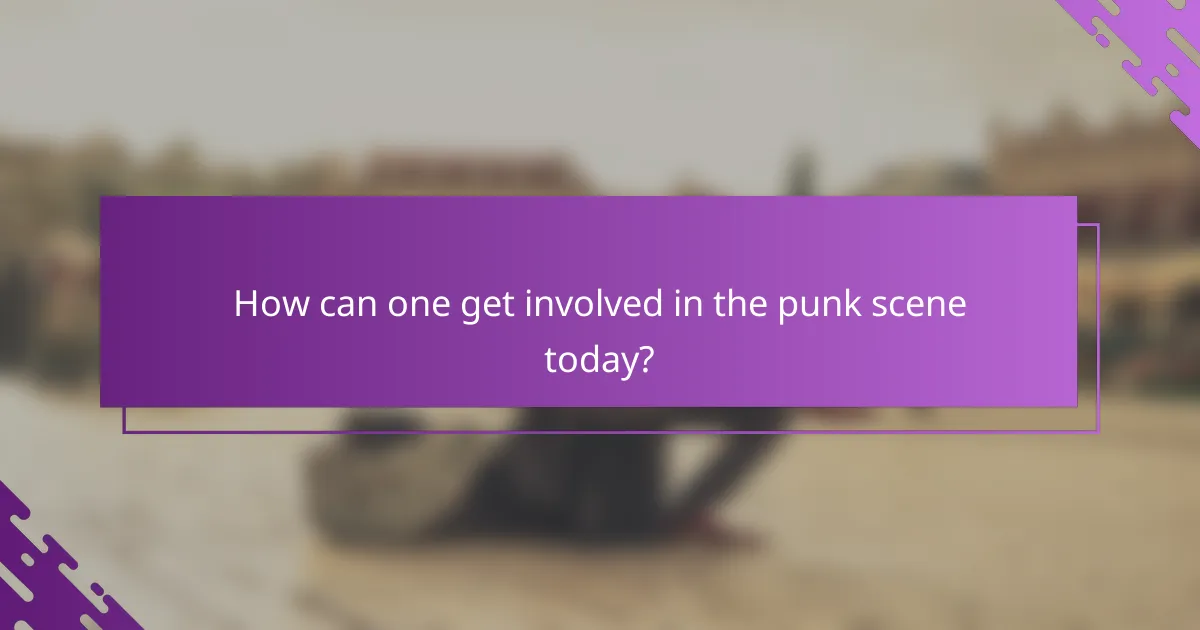
How can one get involved in the punk scene today?
Getting involved in the punk scene today involves engaging with local music communities, attending shows, and participating in DIY events. Whether through joining bands, volunteering at venues, or creating your own music, there are numerous ways to connect with the punk ethos.
Joining local punk bands
Joining a local punk band is one of the most direct ways to immerse yourself in the punk scene. Start by attending local shows to meet musicians and learn about open auditions or jam sessions. Many bands are open to newcomers, especially if you share their passion for punk music.
Consider your musical skills and what you can contribute. Whether you play guitar, drums, or sing, find a band that matches your style and energy. Collaborating with others can lead to creative projects and help you build a network within the community.
Don’t hesitate to reach out to local music schools or community centers that may offer workshops or classes. These can be great places to meet like-minded individuals and potentially form a band.
